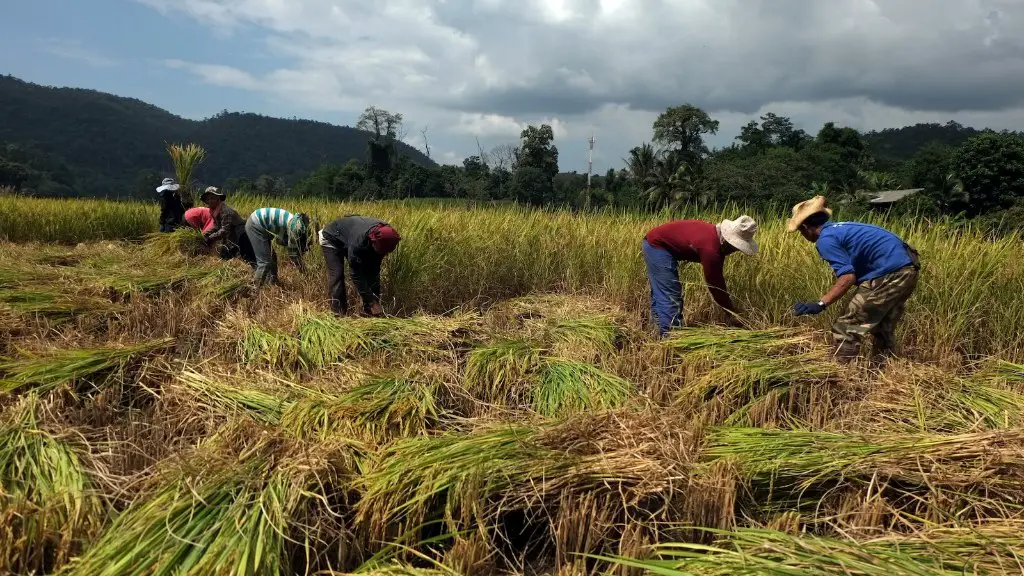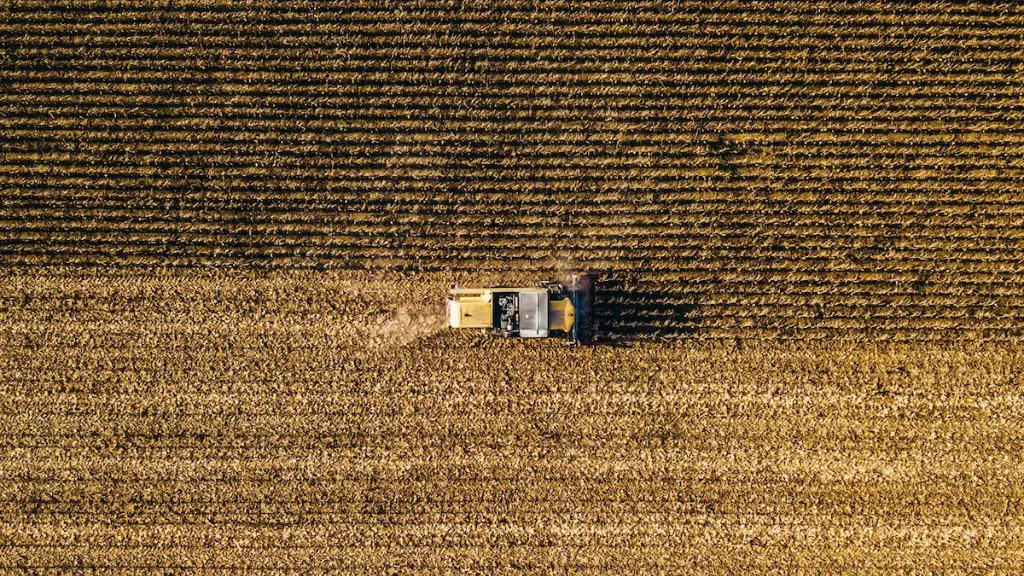Nitrogen fixation is a process that plays an essential role in agriculture. In this process, nitrogen from the air is converted into a form of nitrogen that plants can use. This helps boost crop production, increases soil fertility, and reduces the need for chemical fertilizers. By fixing nitrogen, plants are able to provide their own food sources and avoid synthetic fertilizers.
Nitrogen fixation is an important process as it is an integral part of the nitrogen cycle. Nitrogen is an essential element for living organisms and is found in all proteins. When nitrogen is released from the atmosphere, it is unstable and cannot be used by plants. Nitrogen fixation is the process in which the nitrogen gas (N2) is converted into a form of nitrogen that plants can use. This process is facilitated by bacteria, which are found in the soil. These bacteria convert the N2 in the atmosphere into nitrates, which can be absorbed and utilized by plants.
In agricultural production nitrogen fixation plays an essential role. Without nitrogen fixation, crops would not be able to grow and produce food. Many crops depend on nitrogen, as it is necessary for photosynthesis and growth. Nitrogen enriched soil is important for optimal crop yields, as nitrogen helps improve the quality of the soil as well as increase crop production and reduce the need for additional fertilizers.
Nitrogen fixation is also important in recycling of nutrients and other materials in the soil. Through the nitrogen cycle, nitrogen is able to be recycled and utilized by different organisms. Bacteria in the soil are essential for the nitrogen cycle, and by fixing nitrogen, these essential bacteria are able to survive and flourish in the soil. This helps ensure the balance between the nitrogen in the atmosphere and the nitrogen in the soil.
Furthermore, nitrogen fixation helps reduce the need for chemical fertilizers which are often used to boost crop yields. Chemical fertilizers contain higher concentrations of nitrogen, which can be beneficial for soil, but can also have a negative impact on the environment. By relying on nitrogen fixation, farmers can reduce their need for chemical fertilizers and help reduce the impact of nitrogen-based fertilizers on the environment.
In conclusion, nitrogen fixation plays an essential role in agriculture. Through this process, nitrogen is converted into a form that can be used by plants and is recycled into the soil. Nitrogen-enriched soil is important for optimal crop yields, and nitrogen fixation helps minimize the need for additional chemical fertilizers. Nitrogen fixation is an important process for agricultural production and the environment.
Nitrogen Fixation and Soil Fertility
Nitrogen fixation plays an important role in maintaining soil fertility. Nitrogen is essential for plant growth, and nitrogen-enriched soils are important for optimal crop yields. When nitrogen is released from the atmosphere, it is unstable and cannot be directly used by plants. Nitrogen fixation is a process that helps convert atmospheric nitrogen into a form that can be used by plants. This process is facilitated by bacteria found in the soil, which convert the nitrogen gas present in the atmosphere into nitrates, which can be absorbed and utilized by plants.
Nitrogen-rich soils are important for optimal crop yields, as nitrogen helps improve the quality of the soil as well as increase crop production. Nitrogen helps increase the microbial activity in the soil, which helps create a healthier soil environment and plants. Furthermore, nitrogen fixation helps reduce the need for additional chemical fertilizers, which can have a negative impact on the environment. By relying on nitrogen fixation, farmers can reduce their need for chemical fertilizers and help reduce the impact of nitrogen-based fertilizers on the environment.
Nitrogen-enriched soils also help improve water absorption and retention in the soil, which are important for optimal crop yields. Nitrogen helps bind and store water in the soil, which helps prevent water runoff and soil erosion. This helps support healthy root systems, which is essential for optimal crop yields. Overall, nitrogen fixation is an essential process for maintaining soil fertility, as it helps enhance the productivity of the soil and reduce the need for additional chemical fertilizers.
Role of Legumes in Nitrogen Fixation
Legumes play an important role in nitrogen fixation. Legumes are plants that are able to convert atmospheric nitrogen into a form that can be used by plants. This process is called biological nitrogen fixation, and it is facilitated by the root nodules of the legume plants. These root nodules contain bacteria, which are capable of fixing nitrogen from the atmosphere into a form that plants can use.
Legume plants are able to fix nitrogen through a symbiotic relationship with rhizobia bacteria. Rhizobia bacteria are able to fix atmospheric nitrogen and convert it into nitrates, which can be directly used by plants. The bacteria then enter into the root nodules of the legume plants and receive protection and nutrients in exchange for their nitrogen-fixing abilities.
In addition to their nitrogen-fixing abilities, legumes are also able to replenish the soil with other essential nutrients. Legumes are able to capture nitrogen from the atmosphere and store it in the soil, which helps enrich the soil and improve crop yields. Furthermore, legumes are able to fix phosphorus, carbon, and other essential elements, which are important for optimal crop growth and development.
Overall, legumes play an important role in increasing soil fertility and productive crop yields. Legumes are able to fix atmospheric nitrogen into nitrates, which can be directly used by plants. Legumes are also able to store essential nutrients in the soil, which helps replenish the soil and improve crop production. Legumes are an important part of sustainable agricultural systems and can help increase crop yields while also improving soil fertility.
Nitrogen Fixation and Climate Change
Nitrogen fixation also helps reduce the impact of climate change. Climate change is a global issue and is caused by the release of harmful gases such as carbon dioxide and nitrous oxide. Nitrous oxide is an important component of fertilizer, and is released into the atmosphere when fertilizers are used on crops. Nitrogen fixation helps reduce the need for additional chemical fertilizers, which in turn helps reduce the amount of nitrous oxide released into the atmosphere.
Nitrogen fixation is also beneficial in other ways. By relying on nitrogen fixation, farmers are able to reduce their reliance on fossil fuels, which are a major source of greenhouse gases. As nitrogen fixation is a natural process, it does not use fossil fuels and can help reduce emissions of harmful gases. Furthermore, nitrogen-enriched soils are more resilient to the impacts of climate change, as they are able to better absorb and store water, which helps maintain optimal crop yields even in dry or hot conditions.
Overall, nitrogen fixation helps reduce the environmental impact of agriculture and can help mitigate the effects of climate change. By relying on nitrogen fixation, farmers can reduce their need for chemical fertilizers, reduce their reliance on fossil fuels, and help maintain optimal crop yields even in harsh conditions. Nitrogen fixation is a powerful tool for sustainable agriculture and can help create a healthier and safer environment for everyone.
Limitations of Nitrogen Fixation
Although nitrogen fixation is an important process for agricultural production, it has some limitations. Nitrogen fixation requires bacteria, which are often not present in the soil. This makes it difficult for farmers to rely on nitrogen fixation, as they must be able to cultivate these bacteria in order to take advantage of the process. Furthermore, nitrogen fixation is often slower than chemical fertilizers, making it difficult to rely on in certain situations.
Another limitation of nitrogen fixation is the cost. The costs associated with cultivating bacteria and maintaining an optimal environment for nitrogen fixation can be prohibitive for some farmers. Additionally, nitrogen fixation can be unreliable in certain climates and conditions, as it is heavily impacted by temperature and moisture levels. This can make it difficult for farmers to rely on nitrogen fixation, as they may not be able to achieve optimal results in certain conditions.
Overall, nitrogen fixation is an essential process for agricultural production and can be beneficial for soil fertility and reduced reliance on chemical fertilizers. However, there are some limitations to nitrogen fixation, such as cost, reliability, and the need for bacteria. Nitrogen fixation is an important tool for sustainable and environmentally-friendly agricultural production, and its limitations should be taken into consideration when implementing it.
Conclusion
Nitrogen fixation is an essential process for agricultural production and plays an important role in maintaining soil fertility, reducing the impact of climate change, and reducing the need for additional chemical fertilizers. Legumes play an important role in nitrogen fixation, as they are able to convert atmospheric nitrogen into a form that can be used by plants. Nitrogen fixation also helps replenish the soil with other essential nutrients, which helps improve crop yields. However, nitrogen fixation is not without its limitations. It is often slower than chemical fertilizers, expensive, and unreliable in certain climates and conditions. If these limitations are taken into account, nitrogen fixation can be a powerful tool for sustainable and environmentally-friendly agricultural production.




